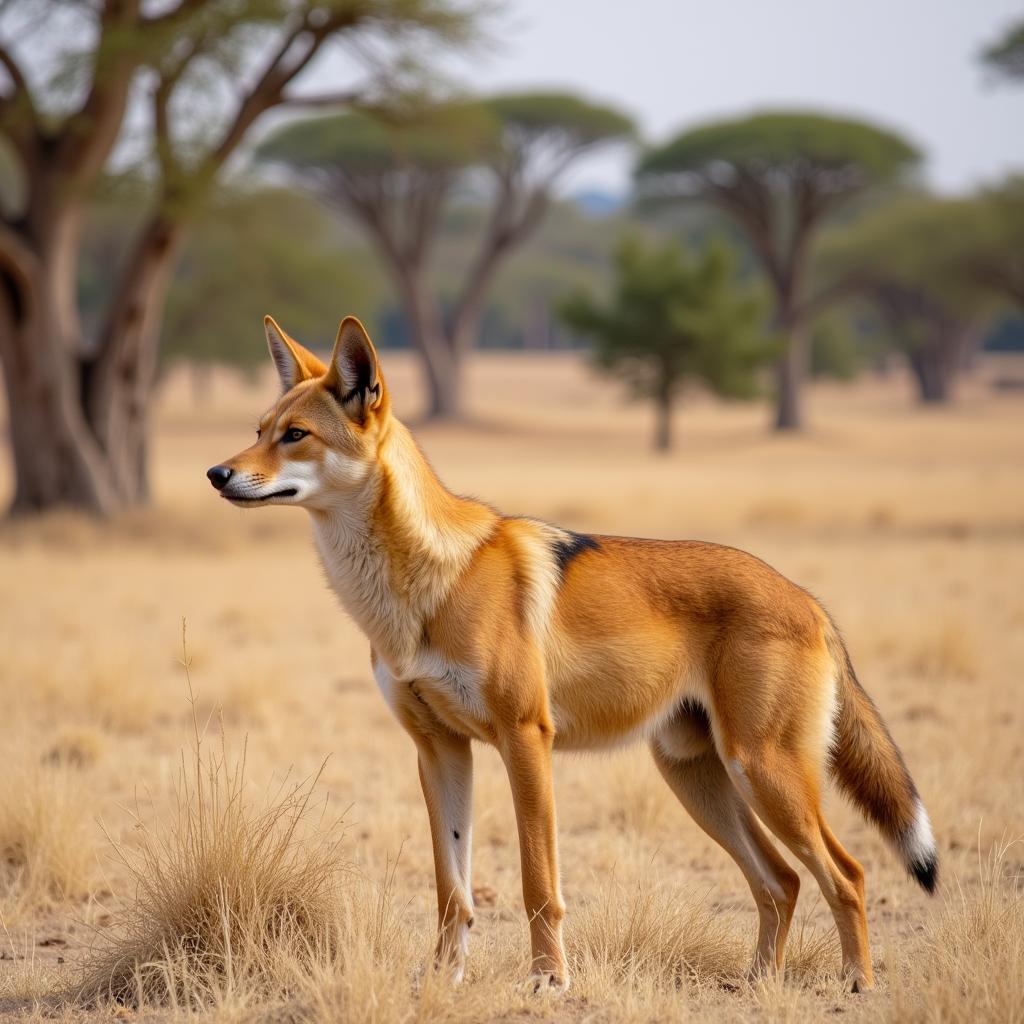Unveiling the African Golden Wolf: Anubis’s Wild Counterpart
The African golden wolf (Canis anthus), often mistaken for a jackal, holds a unique place in the African ecosystem and carries a fascinating connection to the ancient Egyptian god, Anubis. This article delves into the life, habitat, and cultural significance of this captivating canine, exploring its crucial role in maintaining the balance of nature and its intriguing symbolic relationship with the divine.
The African Golden Wolf: More Than Just a Jackal
For centuries, the African golden wolf was misclassified as a golden jackal. Recent genetic studies have revealed its distinct lineage, separating it from its jackal cousins and establishing it as a unique species. This discovery has shed new light on its evolutionary history and ecological importance. The African golden wolf, Canis anthus, is a medium-sized canid with a slender build, long legs, and a bushy tail. Its golden coat, which varies in shade depending on its geographical location, provides excellent camouflage in the arid and semi-arid landscapes it calls home.
Habitat and Distribution: Roaming the African Landscapes
The African golden wolf has a wide distribution across Africa, inhabiting diverse habitats ranging from savannahs and grasslands to mountainous regions and coastal areas. Its adaptability allows it to thrive in a variety of environments, showcasing its resilience and resourcefulness. They are found throughout North and West Africa, as well as in the Horn of Africa.
 African Golden Wolf in its Natural Habitat
African Golden Wolf in its Natural Habitat
Diet and Hunting Strategies: A Skilled Predator
The African golden wolf is a highly adaptable predator, employing diverse hunting strategies to secure its meals. While it primarily hunts small mammals, birds, and reptiles, it also scavenges on carrion and consumes fruits and insects when available. This dietary flexibility is key to its survival in fluctuating environments. Often hunting in pairs or small packs, they are known for their coordinated hunting techniques, showcasing their intelligence and social dynamics. Their howls, which can be heard echoing through the night, serve as a form of communication, strengthening their social bonds and coordinating hunting efforts.
Anubis and the Golden Wolf: A Symbolic Connection
The resemblance between the African golden wolf and the depiction of Anubis, the ancient Egyptian god of the dead, has led to speculation about a symbolic connection between the two. Anubis, traditionally depicted with the head of a jackal-like creature, was associated with mummification and the afterlife. The golden wolf’s scavenging habits and its presence in desert regions, often near burial sites, may have contributed to this association.
The God of the Dead and the Guardian of the Wild
While the exact nature of the connection remains a subject of debate, the association of the African golden wolf with Anubis highlights the animal’s cultural significance in ancient Egypt. It underscores the reverence afforded to animals and their perceived connection to the spiritual realm.
Cultural Significance: Beyond Ancient Egypt
The African golden wolf holds significance in various African cultures, often associated with myths and folklore. Its cunning and adaptability are often admired, and its presence is sometimes interpreted as a sign of good fortune or a warning of impending danger. These diverse interpretations reflect the complex relationship between humans and wildlife in African societies.
Conservation Efforts: Protecting the Golden Wolf
Like many wildlife species, the African golden wolf faces threats from habitat loss, human-wildlife conflict, and disease. Understanding its ecological role and implementing effective conservation strategies are crucial for ensuring its long-term survival. Researchers are working to understand the impact of these threats and develop strategies to mitigate them.
The Importance of Research and Education
Continued research on the African golden wolf’s behavior, ecology, and genetics is vital for developing effective conservation strategies. Educating local communities about the importance of this species and promoting coexistence between humans and wildlife are essential steps towards securing its future.
Conclusion: A Golden Future for the African Wolf?
The African golden wolf, once overshadowed by its jackal cousins, is now recognized as a unique and vital part of the African ecosystem. Its connection to Anubis adds a layer of cultural intrigue, highlighting the complex relationship between humans and wildlife throughout history. By understanding its ecological role and implementing effective conservation strategies, we can ensure that the African golden wolf continues to roam the African landscapes for generations to come.
FAQ
-
What is the difference between an African golden wolf and a jackal? Genetic studies have confirmed that the African golden wolf is a distinct species, separate from jackals.
-
What does the African golden wolf eat? It is an opportunistic predator, feeding on small mammals, birds, reptiles, insects, fruit, and carrion.
-
Where does the African golden wolf live? It is found in diverse habitats across North and West Africa, as well as in the Horn of Africa.
-
Why is the African golden wolf associated with Anubis? Its physical resemblance to the jackal-like depiction of Anubis likely contributed to this association.
-
What are the main threats to the African golden wolf? Habitat loss, human-wildlife conflict, and disease pose significant threats to the species.
-
How can I help conserve the African golden wolf? Supporting conservation organizations, educating yourself about the species, and promoting responsible wildlife tourism are all ways to contribute.
-
Are African Golden Wolves endangered? While not currently listed as endangered, they face increasing threats and require ongoing conservation efforts.
Need more help? Contact us at Phone Number: +255768904061, Email: kaka.mag@gmail.com or visit us at Mbarali DC Mawindi, Kangaga, Tanzania. We have a 24/7 customer service team.



